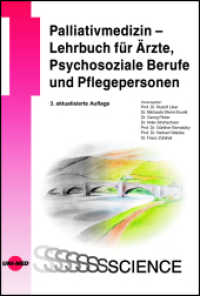- ホーム
- > 洋書
- > ドイツ書
- > Humanities, Arts & Music
- > Psychology
Full Description
The emergence of political identities and communities in (social) media is largely driven by affective responses to current events—a tendency facilitated by the dominance of emotionally and visually oriented communication. However, this mode of community formation leads, first, to the inherent instability and transience of these groups and, second, to the oversimplification of complex socio-political issues into binary, yes/no alternatives. Within this framework, deliberation and argumentation-based problem-solving become increasingly difficult, as discourse is supplanted by emotional reactions that position individuals either "for" or "against" an issue. Particularly significant is the role of affect and emotion in communication during times of crisis—whether in the context of migration, the COVID-19 pandemic, or the war in Ukraine.
This affective role is evident in the anchoring of public discourse to personal emotions and the generation and dissemination of hashtags and tags that consolidate diverse phenomena under a unified label. Such collective identity coalesces around connective action, which is primarily driven either by opposition to the established order or by the reinforcement of a preexisting system's foundations. Consequently, the emergence of these affective publics must be analyzed within the broader context of power dynamics and evolving forms of identification in the contemporary media sphere—forms rooted in shared practices of expression, action, and interpretation.
This edited volume will explore the manifestations of affective semiosis (meaning-making) at the socio-cultural and discursive levels. Cultural context, emotional reactions, and affective semiosis play a crucial role in shaping how issues related to identity and security are articulated in both domestic and foreign policy, as well as in the ways solutions to these challenges are sought. By adapting the concept of affective semiosis for the analysis of discursive structures, this volume offers an innovative and effective approach to identifying the triggers of emotional reactions in discourse and examining their impact on the construction of political identities, fear scenarios, misinformation campaigns, polarization, and other dynamics within networked societies.
The volume includes both theoretically oriented papers as well as analyses of empirical materials.
Contents
PART I: Unpacking Affective Semiosis: The Intersection of Political Discourse, Semiotics, and Psychology.- Chapter 1: The passions-myths of a collective political actant.- Chapter 2: An appraisal perspective on public discourse.- Chapter 3: Political engagement and extremism. Observations from the interpretive social sciences.- Chapter 4: Politics of affect is the composition of bodies.- Chapter 5: Thinking about dialogues sustaining today's conflictive world: Bakhtin's ideas on laughter and carnival toward contradictive views.- PART II: Affective Publics: Emotion, Media, and Politics.- Chapter 6: The Pathemic Dimension of Knowledge. Semiotic Reflections on Trust.- Chapter 7: Affective atmospheres: collective emotions inside and outside the digital sphere.- Chapter 8: Emotional governmentality: visualising Estonia's European 'capitals'.- Chapter 9: Emotional Mediation in the Construction of Political Personae: Between Political Branding and Semiotic Construct".- PART III: Affective Investment and Discursive Dominance in Political Communication.- Chapter 10: Affective Securitization of Emotions in Putin's Russian WWII Narrative.- Chapter 11: The affective power of politics: Spheres of influence, justice, and peace in the Russo-Ukrainian War.- Chapter 12: Navigating Emotions: The Role of Affective Strategies in Russian History Narratives.- Chapter 13: Cultural Psychological Devices for Political Speeches: How to Make a Speech More Personal.








